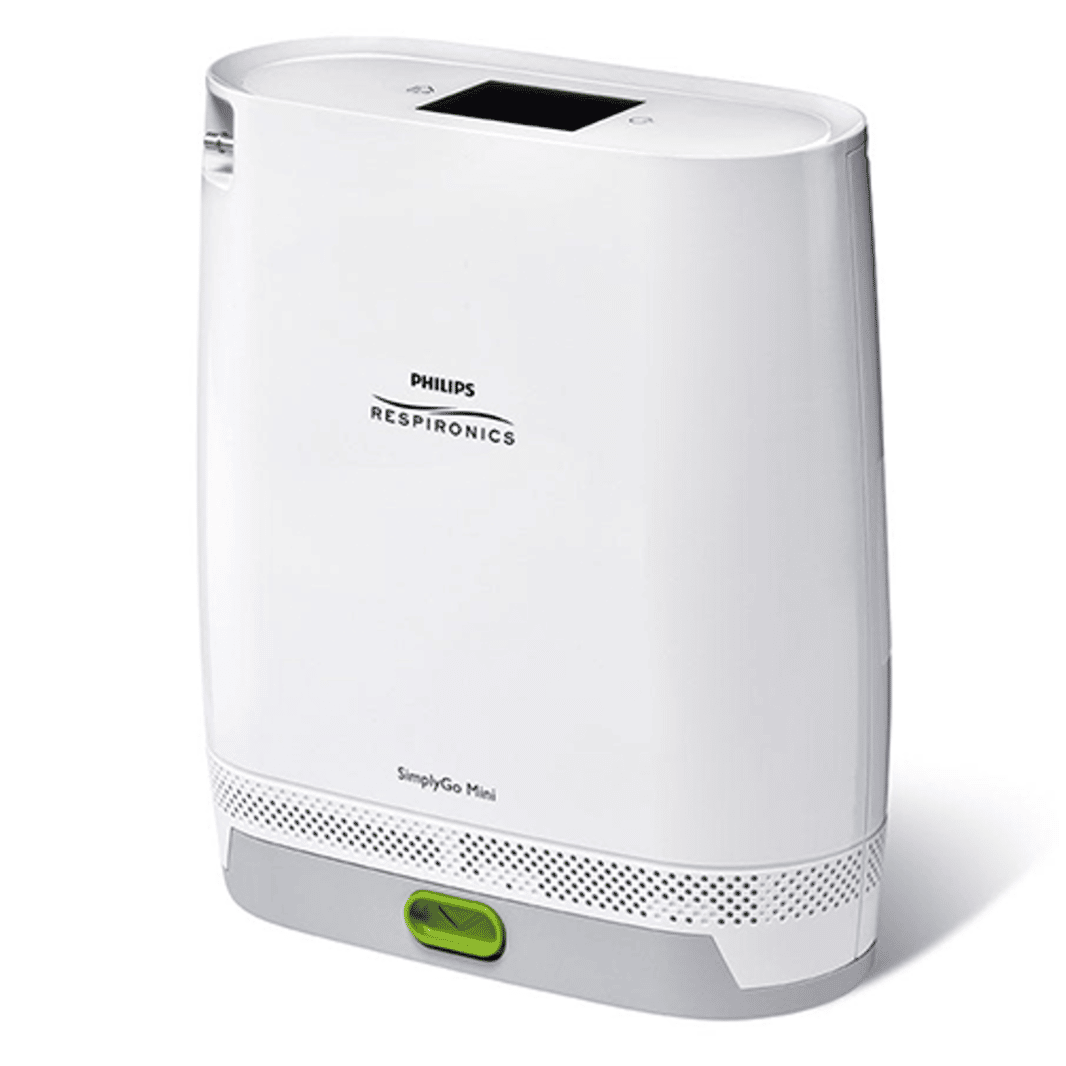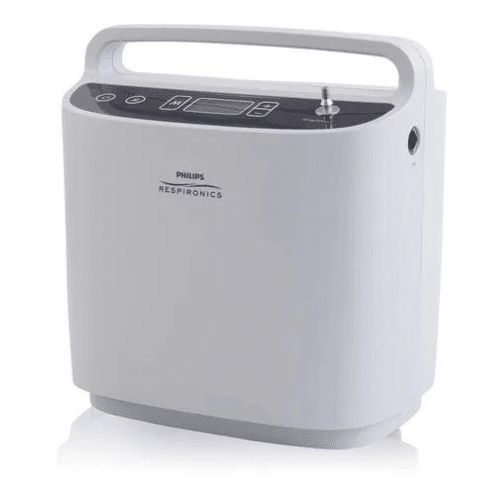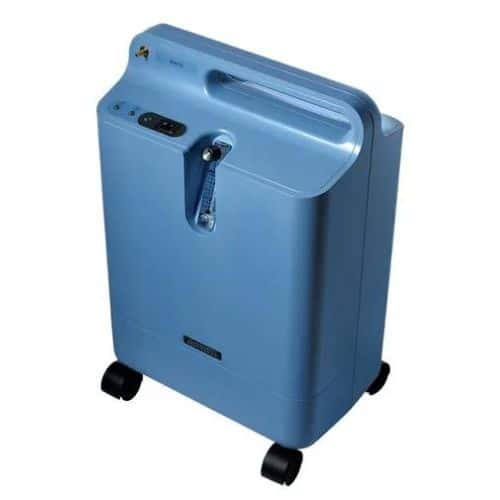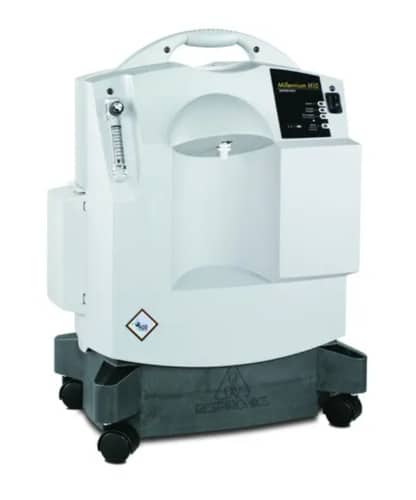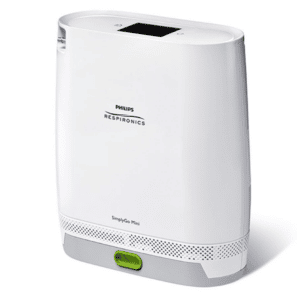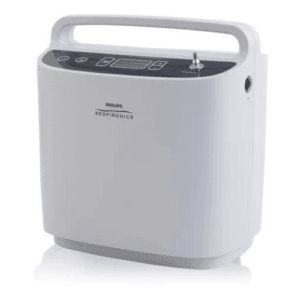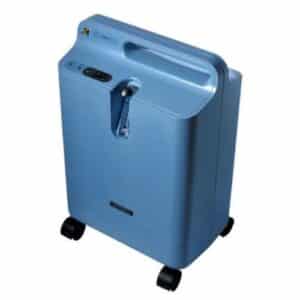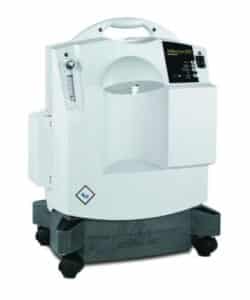- Cost: $2,795
- Weight: 5 pounds
- Dimensions: 8.3 inches wide x 3.6 inch deep x 9.4 inches high
- Battery life: 4.5 hours
- Battery charging time: 4 hours
- Delivery/flow type: Pulse
- Range of flow settings: 1–5
- Noise level: 43 decibels (about as loud as a refrigerator)
- Accessories: Accessory bag, cannula, carrying case with shoulder strap
Philips Respironics Oxygen Machine Review 2025
Key Takeaways
- Philips Respironics offers both portable and stationary oxygen concentrators for use on-the-go and at home.
- Philips Respironics oxygen concentrators can provide up to 2 liters per minute with the portable SimplyGo Mini and up to 10 liters per minute with the stationary Millennium M10.
- Philips Respironics oxygen concentrators are more expensive than some competitors, but may be more energy efficient and generate lower electricity costs.
Philips Respironics is a line of respiratory care products, including both mobile and stationary oxygen concentrators, that supply oxygen to people in and out of the home. Our January 2023 survey of 600 portable oxygen concentrator users found 26.83% of respondents used a Philips Respironics device, making it the most widely used brand.1 We named the Respironics SimplyGo Mini as the “Easiest to Use” device in a review of the best portable oxygen concentrators. In our review of the best home oxygen concentrators, we named the Respironics EverFlo the “Quietest” continuous flow home unit.
If you have an oxygen prescription or require oxygen therapy, our Philips Respironics oxygen concentrator review can help you compare the available units to find the right device for your needs.
Why you can trust our expert review
Our team recommends products and services we believe provide value in the lives of our readers. We’ve spent more than 1,000 hours carrying out in-depth research on portable oxygen concentrators to give you the most accurate review. To make our selections, we:
- Engaged in independent research of portable oxygen concentrator users
- Consulted with three geriatric care experts
- Consulted with one respiratory therapist
- Mystery shopped four brands and five models of portable oxygen concentrators
- Reviewed academic research into the efficacy of portable oxygen concentrators
Pros and cons of Philips Respironics
Table 1 Comparison of Philips Respironics portable oxygen concentrators
|
SimplyGo Mini
Check Price
|
SimplyGo
Check Price
|
EverFlo
Check Price
|
Millennium M10
Check Price
|
|
|---|---|---|---|---|
| Cost* | $2,795 | $2,750 | $699 | $1,395 |
| Battery life | 4.5 hours (single battery) | 3 hours (single battery, pulse setting 2 or continuous flow 0.5 L/min) | N/A | N/A |
| Flow type | Pulse | Pulse, continuous | Continuous | Continuous |
| Flow settings | 1–5 | Pulse 1–6, Continuous 0.5-2 in 0.5 L increments | 1–5 L/min | 1–10, in 1 L increments |
| Noise level in decibels (dB) | 43 | 43 | 45 | 50 |
| FAA-approved | Yes | Yes | No | No |
| Warranty or protection plan | 3 years | 3 years | 3 years | 1 year |
*Oxygen concentrator pricing can be higher if you live in Massachusetts or New Jersey, which require a licensed respiratory therapist to deliver, set up, and adjust the oxygen dose of your concentrator.
Philips Respironics portable oxygen concentrator reviews
Philips Respironics stationary oxygen concentrator reviews
How much do Philips Respironics oxygen concentrators cost?
Philips Respironics oxygen concentrators can cost $1,500–$3,300, but pricing can vary depending on the state you live in.
Why might pricing vary?
If you live in Massachusetts or New Jersey, you may see a higher price for your Philips Respironics oxygen concentrator. These states require a licensed respiratory therapist to deliver, set up, and titrate (adjust the oxygen dose of) your concentrator. The cost of this service is reflected in the total price of the unit. This requirement can be beneficial as it offers an opportunity to ask questions and be sure that your Philips Respironics device is properly set up.
Does insurance or Medicare cover oxygen concentrators?
Insurance coverage for a Philips Respironics oxygen concentrator will depend on your insurance plan. If your insurance plan does offer some coverage for oxygen equipment, it is likely you will need to meet certain requirements, such as a physician’s determination that supplemental oxygen is medically necessary. It’s important to contact your insurance provider directly to confirm coverage and eligibility before purchasing a Philips Respironics oxygen concentrator.
If you have Medicare and require oxygen as determined by your doctor, Medicare will cover the rental costs of oxygen equipment for an initial period of 36 months. After that time, your oxygen equipment provider is obligated to continue providing supplies for an additional 24 months. After those five years, if you still need oxygen, Medicare will initiate a new 36-month rental term. You can find more details about this coverage on the Medicare website.4
How to pay for Philips Respironics oxygen concentrators
Besides paying with insurance or cash, the other options to pay for a Philips Respironics oxygen concentrator are a health savings account, flexible spending account, or CareCredit.
Health savings account (HSA): An HSA allows you to set aside pre-tax money to use for eligible health expenses.5 Oxygen equipment is included in the full list of qualifying expenses, but doesn’t specify brand names.6
Flexible spending account (FSA): An FSA is an account your employer deposits pre-tax salary funds into. These accounts can be used to reimburse a variety of purchases, such as medical expenses and oxygen concentrators.
CareCredit: CareCredit is a credit card issued specifically for health care expenses, and you can use it to purchase oxygen concentrators, including those from Philips. Eligibility is subject to credit approval, and Care Credit can only be used at participating retailers.
Other Philips Respironics breathing devices
If you use supplemental oxygen, you may also use a continuous positive airway pressure (CPAP) device, bilevel positive airway pressure (BiPAP) device, or nebulizers to treat your condition and promote sleep therapy. Philips Respironics has CPAP, BiPAP, and nebulizer models that may be compatible with your Philips Respironics oxygen concentrator.
DreamStation: Philips Respironics DreamStation CPAP devices are positive airway pressure units and include both CPAP and BiPAP models. The DreamStation CPAP device uses smart technology to track your daily progress. Be aware that some DreamStation, DreamStation 2, and DreamStation Go therapy devices are currently affected by an FDA class I recall due to issues with sound abatement foam degradation.7
DreamWear: Philips Respironics DreamWear is a mask system that includes a full face mask, a nasal mask, and a nasal pillow for use with the Philips Respironics DreamStation. The full face mask covers your nostrils and mouth, the nasal mask covers only your nose, and the nasal pillow rests below your nose to deliver air just inside the nostrils.
InnoSpire Essence: Philips Respironics InnoSpire Essence nebulizer system is used to dispense liquid medicine in the form of a mist for breathing treatments.
Philips Respironics warranty, maintenance, and care
Philips Respironics oxygen concentrators come with different warranties depending on the model and retailer. If purchased online from a retailer like the Oxygen Concentrator Store, the warranty on each model covers:
SimplyGo Mini: Three-year warranty on concentrator unit and 90-day warranty on accessories like tubing, chargers, and carrying cases.
SimplyGo: Three-year warranty on concentrator unit and 90-day warranty on accessories like tubing, chargers, and carrying cases.
EverFlo: Three-year warranty on the unit, with the option to purchase a five-year warranty at an additional cost.
Millennium M10: Three-year warranty on the unit.
Maintenance and care of Philips Respironics mobile and stationary oxygen concentrators is relatively simple and detailed in each model’s user manual. The components of each model are slightly different, but you can expect to clean or replace filters and sieve beds (or columns).
Extra filters are not included with most Philips Respironics units. Make sure you purchase the correct filter for your unit according to the user’s manual. Replacement filters for Philips Respironics units range in price from $5–$59 depending on the type of filter and oxygen concentrator model. Replacing these parts is typically as simple as removing the old filter or sieve bed and inserting a new one in its place. For more complex maintenance or repairs, you’ll need to speak with your oxygen concentrator supplier for assistance.
Philips Respironics recall
In June 2021, Philips issued a recall of some of its respiratory devices.8 The recall applies to devices manufactured between 2009 and April 26, 2021.
There were no oxygen concentrators involved in the recall. Affected devices included some Philips Respironics CPAP, BiPAP, and ventilator devices. The recalled devices were made with a polyester-based foam to reduce noise and vibrations. This foam was found to occasionally break down, and small pieces of black foam were released into the breathing system and tubing. Inhaling the foam is a potential health hazard.
In April 2023, the FDA updated the recall to a Class I recall, meaning that some CPAP, bilevel PAP, and ventilator devices could result in serious injury or death.7 In some cases, Philips Respironics is issuing replacement devices, which the FDA is monitoring. If you own a Philips Respironics CPAP, BiPAP, or ventilator device, check the FDA update to see if your device is on the list and instructions for getting a replacement device.
Philips Respironics customer service
Philips Respironics oxygen concentrators are available from authorized distributors. These include durable medical supply stores and online retailers like the Oxygen Concentrator Store. Oxygen Concentrator Store customer service is available through:
- Phone (888-721-2372) available 365 days a year with the following hours:
- 6 a.m. to 8:30 p.m. MT, Monday through Thursday
- 6 a.m. to 7 p.m. MT, Friday
- 7 a.m. to 6 p.m. MT, Saturday
- 8 a.m. to 5 p.m. MT, Sunday
- Email (service@amsrco.com)
- Contact form on website (https://www.oxygenconcentratorstore.com/contact)
- Live chat on website (https://www.oxygenconcentratorstore.com)
Table 2 Comparison of Philips Respironics vs. other portable oxygen concentrators
Brand | Portable oxygen concentrator models | Stationary oxygen concentrator models | Price range |
|---|---|---|---|
| Respironics | SimplyGo, SimplyGo Mini | EverFlo, Millennium M10 | $895–$2,595 |
| Inogen | Inogen One G4, Inogen One G5 | Inogen At Home 5L | $1,895–$3,165 |
| Caire | Freestyle Comfort | Companion 5, AirSep Newlife Intensity 10 | $1,395–$3,195 |
| Invacare | Platinum Mobile Oxygen Concentrator | Perfecto2 Home Concentrator, Platinum 10 Home Concentrator | $1,495–$2,995 |
How we chose the best portable oxygen machines
We consulted with three geriatric care experts and a respiratory therapist to learn more about transportable oxygen concentrators and how they can enhance users’ quality of life. Based on our expert consultations and research, we determined the following factors to be important for our readers when shopping for a portable oxygen concentrator unit:
- Cost
- Ease of use
- Oxygen delivery method
- Number of flow settings
- Weight
- Battery life
- Time to recharge battery
- Warranty
- Availability (all devices available online or in brick-and-mortar stores)
We had all of our selections medically reviewed by an expert in the field to ensure that each brand and model is appropriate for our readers’ needs.
Bottom line
Philips Respironics is a popular brand of oxygen concentrators and respiratory devices made to treat a range of respiratory conditions. The easy to carry SimplyGo Mini is the lightest device at only 5 pounds with a maximum oxygen output of 2 liters per minute. The SimplyGo is also portable, but offers both pulse and continuous oxygen flow delivery. Both transportable units are FAA approved for use on airplanes.
The Respironics EverFlo is a stationary unit that weighs 31 pounds and provides a continuous flow of up to 5 liters per minute of oxygen. The largest Respironics oxygen concentrator is the Millennium M10. This unit weighs 53 pounds but can provide a maximum oxygen output of up to 10 liters per minute of continuous oxygen, making it a good option for those with high oxygen therapy needs.
Frequently asked questions
Philips Respironics issued a recall for some of its ventilator, CPAP, and BiPAP machines in June 2021 due to potential breakdown of a foam used in the devices. In April 2023, the FDA updated the recall to a Class I recall, the most serious type of recall, due to the risk of serious injury or death.7 The FDA is monitoring the distribution of replacement devices. More information can be found here.
Philips Respironics oxygen concentrators are not involved in the recent recall and are considered safe to use by health care providers. As always, it is important to follow device instructions and your doctor’s prescription.
Philips Respironics oxygen concentrators range in price from roughly $1,500–$3,300.
The categories of recalled Philips Respironics devices include ventilators, CPAP, and BiPAP machines. Philips Respironics oxygen concentrators have not been included in the recall.
Yes, Philips Respironics oxygen concentrators include a nasal cannula. A cannula is a small medical device made of soft plastic with two prongs that you wear in your nostrils to deliver oxygen from your oxygen concentrator through clear plastic tubing.
Sources
- NCOA Portable Oxygen Concentrator Survey. 600 respondents. Conducted using Pollfish. Launched January 2023.
- Federal Aviation Administration. Acceptance Criteria for Portable Oxygen Concentrators. Found on the internet at https://www.faa.gov/about/initiatives/cabin_safety/portable_oxygen
- International Noise Awareness Day. Common Noises – How Loud is Too Loud? Found on the internet at https://noiseawareness.org/info-center/common-noise-levels/
- Medicare.gov. Oxygen Equipment Coverage. Found on the internet at https://www.medicare.gov/coverage/oxygen-equipment-accessories
- Healthcare.gov. Health Savings Account (HSA). Found on the internet at https://www.healthcare.gov/glossary/health-savings-account-hsa/
- Internal Revenue Service. 2021 Publication 502. Found on the internet at https://www.irs.gov/pub/irs-pdf/p502.pdf
- US Food and Drug Administration. UPDATE: Certain Philips Respironics Ventilators, BiPAP Machines, and CPAP Machines Recalled Due to Potential Health Risks: FDA Safety Communication. Found on the internet at https://www.fda.gov/medical-devices/safety-communications/update-certain-philips-respironics-ventilators-bipap-machines-and-cpap-machines-recalled-due
- Philips. Medical Device Recall Information. Found on the internet at https://www.usa.philips.com/healthcare/e/sleep/communications/src-update


